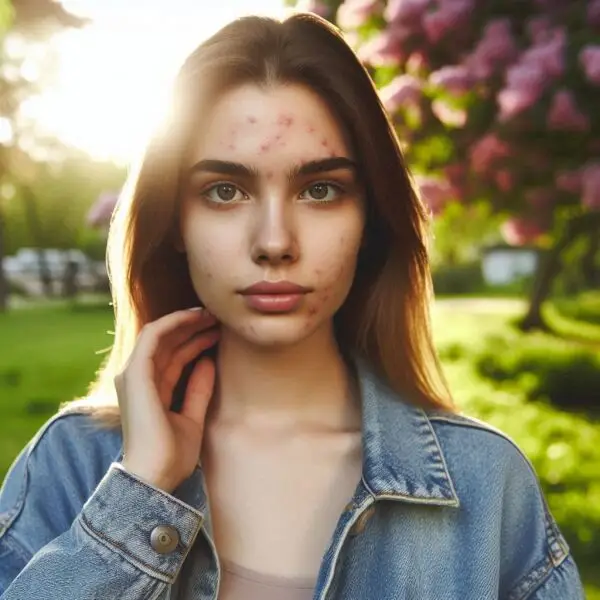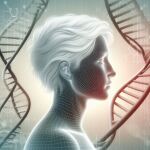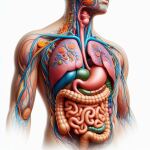Adult Acne: Causes, Treatments, and Effective Tips
Discover why acne affects adults, the most effective treatments, and expert advice to manage it successfully. Regain confidence in your skin!...
Table of Contents
- Adult Acne: Causes, Treatments, and Tips
- Causes of adult acne
- Effective Treatments for Adult Acne
- Tips for Managing Adult Acne
Follow Patricia Alegsa on Pinterest!
Adult Acne: Causes, Treatments, and Tips
Acne is commonly associated with adolescence, but many people continue to deal with it in adulthood. This phenomenon, which may seem surprising to some, is a reality that affects the quality of life and emotional well-being of those who experience it.
The skin, being our barrier to the world, reflects both our internal health and our external concerns.
Although juvenile acne is primarily associated with puberty, adult acne has more complex roots. Hormonal fluctuations play a crucial role, especially in women undergoing the menstrual cycle, pregnancy, or menopause.
Causes of adult acne
Although juvenile acne is primarily associated with puberty, adult acne has more complex roots. Hormonal fluctuations play a crucial role, especially in women undergoing the menstrual cycle, pregnancy, or menopause.
These hormonal changes can increase sebum production, leading to clogged pores and acne breakouts. Additionally, stress is a significant factor.
Cortisol, known as the "stress hormone," can exacerbate oil production in the skin, contributing to the appearance of pimples. Other factors include genetic predisposition, the use of inadequate cosmetics, and a diet high in sugars and dairy.
Addressing adult acne requires a personalized approach, as every skin is unique. Treatment options vary from topical solutions to more invasive interventions:
- Topical creams and gels: Ingredients like retinoids and salicylic acid are effective in reducing inflammation and improving skin health.
- Oral treatments: In severe cases, antibiotics may be helpful, although their use should be monitored to avoid bacterial resistance.
- Hormonal therapy: Oral contraceptives or anti-androgens may be recommended, especially for women, under the guidance of health professionals.
- Isotretinoin: This powerful medication is reserved for severe cases and requires strict medical supervision.
- Dermatological procedures: Techniques such as laser treatments, peels, or microdermabrasion can improve scars and skin texture.
Beyond medical treatments, adopting healthy habits is crucial to control acne:
- Skin care: Using non-comedogenic products and maintaining a gentle cleansing routine can prevent breakouts.
- Balanced diet: Reducing the intake of sugars and dairy, and avoiding ultra-processed foods can have a positive impact on the skin.
- Stress management: Practicing exercise, meditation, and ensuring adequate rest helps keep stress levels under control.
- Sun protection: Applying sunscreen daily is essential, especially if using treatments that sensitize the skin.
Adult acne not only affects physical appearance but also self-esteem and the social life of those who suffer from it. Frustration and anxiety are common, and stress about appearance can worsen the situation, creating a difficult cycle to break.
Therefore, it is essential to seek the guidance of a dermatologist when facing acne in adulthood, avoiding self-medication and the use of products without professional recommendation. Proper care not only improves the skin but also the emotional well-being of the person.
Effective Treatments for Adult Acne
Addressing adult acne requires a personalized approach, as every skin is unique. Treatment options vary from topical solutions to more invasive interventions:
- Topical creams and gels: Ingredients like retinoids and salicylic acid are effective in reducing inflammation and improving skin health.
- Oral treatments: In severe cases, antibiotics may be helpful, although their use should be monitored to avoid bacterial resistance.
- Hormonal therapy: Oral contraceptives or anti-androgens may be recommended, especially for women, under the guidance of health professionals.
- Isotretinoin: This powerful medication is reserved for severe cases and requires strict medical supervision.
- Dermatological procedures: Techniques such as laser treatments, peels, or microdermabrasion can improve scars and skin texture.
Tips for Managing Adult Acne
Beyond medical treatments, adopting healthy habits is crucial to control acne:
- Skin care: Using non-comedogenic products and maintaining a gentle cleansing routine can prevent breakouts.
- Balanced diet: Reducing the intake of sugars and dairy, and avoiding ultra-processed foods can have a positive impact on the skin.
- Stress management: Practicing exercise, meditation, and ensuring adequate rest helps keep stress levels under control.
- Sun protection: Applying sunscreen daily is essential, especially if using treatments that sensitize the skin.
Adult acne not only affects physical appearance but also self-esteem and the social life of those who suffer from it. Frustration and anxiety are common, and stress about appearance can worsen the situation, creating a difficult cycle to break.
Therefore, it is essential to seek the guidance of a dermatologist when facing acne in adulthood, avoiding self-medication and the use of products without professional recommendation. Proper care not only improves the skin but also the emotional well-being of the person.
Subscribe to the free weekly horoscope
Aquarius Aries Cancer Capricorn Gemini Leo Libra Pisces Sagittarius Scorpio Taurus Virgo
-
 Is Life Expectancy Stagnating? New Studies Reveal the Truth
Is Life Expectancy Stagnating? New Studies Reveal the Truth
Life expectancy is slowing down: studies reveal that medical advances no longer boost longevity as they used to. Have we reached the human limit? -
 Spring Astenia? Discover how to manage its impact on your mood
Spring Astenia? Discover how to manage its impact on your mood
Spring Astenia: discover how the change of season impacts your energy and mood. Learn to recognize and manage its effects. -
 Discover the fruit rich in vitamin C that helps you lose weight
Discover the fruit rich in vitamin C that helps you lose weight
Fruit rich in vitamin C and water, ideal for weight loss. Nutritionists recommend it to improve nutrition and strengthen the immune system. -
 The surprising benefits of walnuts and learn how to integrate them into your daily diet
The surprising benefits of walnuts and learn how to integrate them into your daily diet
Rich in omega-3, antioxidants, and fiber, these wonders nourish heart and mind, reduce stress and cholesterol. A delight that takes care of your health holistically! -
 Colon cancer diagnosis is increasing in young people: ultra-processed foods under suspicion
Colon cancer diagnosis is increasing in young people: ultra-processed foods under suspicion
Colon cancer is increasing in people under 50: diet and ultra-processed foods under scrutiny. Experts warn: current habits increase the risk.
I am Patricia Alegsa
I have been writing horoscope and self-help articles professionally for over 20 years.
Subscribe to the free weekly horoscope
Receive weekly in your email the horoscope and our new articles on love, family, work, dreams and more news. We do NOT send spam.
Astral and numerological analysis
-
 Discover your future, secret personality traits and how to improve in love, business and life in general
Discover your future, secret personality traits and how to improve in love, business and life in general
-
 Online Dream Interpreter: with artificial intelligence
Do you want to know what a dream you had means? Discover the power of understanding your dreams with our advanced online dream interpreter using artificial intelligence that responds to you in seconds.
Online Dream Interpreter: with artificial intelligence
Do you want to know what a dream you had means? Discover the power of understanding your dreams with our advanced online dream interpreter using artificial intelligence that responds to you in seconds.
-
 How often should we change bath towels and bed sheets?
How often should we change bath towels and bed sheets?
Change towels every 3 uses! They accumulate dead skin cells, sweat, and more. Don't turn them into your own ecosystem! ?? -
 How to Rest Our Brain from Social Media
How to Rest Our Brain from Social Media
Give Your Brain a Break: Disconnect from Social Media and Combat Neurochemical Imbalance for Lasting Well-being Without Relying on Technology. -
 Say goodbye to extra weight during menopause with 6 healthy habits!
Say goodbye to extra weight during menopause with 6 healthy habits!
Menopause and extra pounds, goodbye! Discover 6 habits to prevent it. Hormones, muscles, and the couch play a role, how about we teach them a lesson? -
 Discover the fruit rich in Vitamin D, excellent for your bone health
Discover the fruit rich in Vitamin D, excellent for your bone health
Discover the fruit that shines in vitamin D, crucial for your bones and well-being. Beyond the sun and fish, this delight will surprise you. -
 Discover the effects of quitting sugar: fatigue, anxiety, and benefits
Discover the effects of quitting sugar: fatigue, anxiety, and benefits
Discover the changes in your body when you quit sugar: fatigue, anxiety, and cravings at first, but soon you will enjoy benefits for your physical and mental health. -
 Tattoos can cause cancer: a type of lymphoma
Tattoos can cause cancer: a type of lymphoma
The discovery that tattoos may increase the risk of lymphoma underscores the need for more research in this area and raises important questions about the long-term safety of tattoos. -
 The Surprising Benefits of Swimming for Body and Mind
The Surprising Benefits of Swimming for Body and Mind
Discover swimming: the perfect exercise for everyone. Improve your cardiovascular health, strengthen muscles, and relieve stress while having fun. Dive in now! -
 The relationship between poor sleep and lactose intolerance
The relationship between poor sleep and lactose intolerance
Yes! There is a relationship between sleeping poorly and having trouble digesting lactose, which is the sugar in milk. Find out how to solve this problem here. -
 What does it mean to dream of the birth of something of one's own?
What does it mean to dream of the birth of something of one's own?
Discover the meaning of a revealing dream: What does the birth of something of your own symbolize in your dreams? Explore its interpretation and find answers today! -
 What does it mean to dream of shower curtains?
What does it mean to dream of shower curtains?
Discover the hidden meaning behind your shower curtain dreams - do you feel vulnerable or protected? Read our article and find out! -
 Okinawa Diet: The Key to a Long and Healthy Life
Okinawa Diet: The Key to a Long and Healthy Life
Discover the Okinawa diet, known as the 'recipe for longevity.' With low-calorie foods and antioxidants, it promotes a long and healthy life. -
 Zodiacal flirting: avoid making these mistakes
Zodiacal flirting: avoid making these mistakes
Discover the mistakes to avoid when flirting with zodiac signs and conquer successfully. -
 What does it mean to dream of garlic?
What does it mean to dream of garlic?
Discover the mysterious meaning behind dreaming of garlic - is it an omen of good luck or a warning of danger? Read our article and find out!